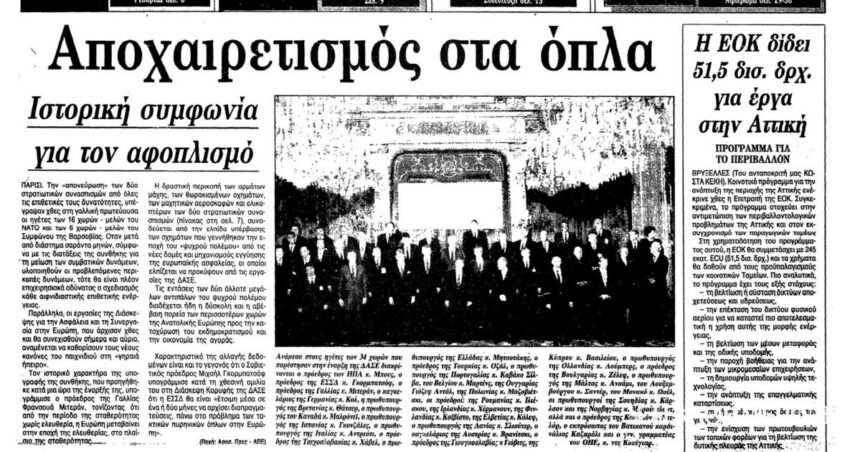The changes in Eastern Europe during the second half of 1989 were so sweeping that they surprised not only the West but also the leading power of the socialist camp, the Soviet Union. In October 1989, the Warsaw Pact declared that the USSR military would no longer interfere in the internal affairs of its member states, effectively abandoning the Brezhnev Doctrine. The results of this decision became immediately apparent. One by one communist regimes collapsed, sometimes smoothly and sometimes violently, such as in Romania, where Nicolae Ceausescu and his wife Elena were arrested, tried and executed on Christmas Day 1989. The fall of communism in Eastern Europe led to foreground the prospects for the “reunification” of the Old Continent and the peaceful coexistence of its states. There was a widespread feeling that the Cold War was coming to an end.
This feeling was confirmed on November 19, 1990, when the member states of the North Atlantic Treaty and the Warsaw Pact signed the Treaty on the Convention Forces (CFE), which provided for the reduction of the military forces of the two coalitions and the imposition of an upper limit for their conventional equipment. It was an agreement which was the fruit of twenty months of negotiations, having been launched after Soviet leader Mikhail Gorbachev’s speech to the UN General Assembly in December 1988. The Treaty of 19 November 1990 was the swan song of the Warsaw Pact, which it dissolved a few months later, on February 25, 1991. Exactly ten months later, on Christmas 1991, the Soviet Union also dissolved. During this time, important steps were taken to end the confrontation between the two superpowers on the European continent: in June, Soviet troops withdrew from Czechoslovakia and Hungary, and in July, Gorbachev and US President George W. Bush signed the START Treaty, which provided the reduction of strategic, intercontinental and nuclear weapons by 25-30%.
“Kathimerini” of November 20, 1990 characterized as historic the Treaty signed in Paris the day before, in which Greece also participated as a member state of NATO. The “denervation” of the two military coalitions from all their offensive capabilities was signed yesterday in the French capital by the leaders of the 16 NATO member countries and the 6 Warsaw Pact member countries. When, after a period of forty months, in accordance with the provisions of the treaty on the reduction of conventional forces, the planned reductions in forces are implemented, then it will be operationally impossible to plan any surprise offensive action”, characteristically wrote “Kathimerini” on its front page.
Continuing, the paper highlighted the challenges faced by former communist states in democratizing political life and adapting to the capitalist system. “The tensions of the two former great rivals of the cold war are already being followed by the difficult and uncertain path of most Eastern European countries towards the consolidation of democratization and the market economy”. Indeed, the transition to a market economy was accompanied by a major financial crisis and a significant drop in GDP in Eastern European countries during the 1990s.
Column Editor: Myrto Katsigera, Vassilis Minakakis, Antigone-Despina Poimenidou, Athanasios Syroplakis





